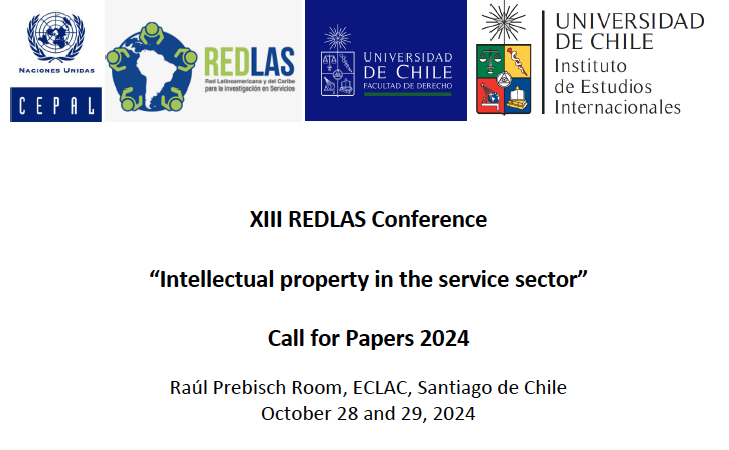XIII REDLAS Conference: Call for Papers 2024 - Intellectual property in the service sector
Work area(s)
Topic(s)

Background
Services represent approximately two-thirds of GDP and employment in Latin America and the Caribbean (LAC) but only 13.7% of the region's exports in 2023. In particular, digitally enabled services (SED) barely reached 4.6% of LAC exports in 2023, showing great growth opportunities for the region. Most of these services are knowledge-intensive, such as telecommunications, computing, software, financial, business, and creative services (literature and art, among others). Boosting service activities and exports, especially SSD, will increase growth, productivity and quality jobs throughout the economy.
In LAC, the SED grew 7.8% per year on average between 2010 and 2023, exceeding the average growth in total services exports of 4.8% in the same period. This expansion partially results from the strong push towards digital transformation, strengthened by the pandemic. In turn, important advances are observed in the region in promoting electronic commerce and, in this framework, creating digital products.
This phenomenon has led many countries to rethink the intellectual property system in services, especially to adapt it to the digital age. As the global economy and trade shift increasingly towards services, it is crucial to understand the importance of intellectual property rights (IPR)—including copyright and related rights, patents, trademarks, industrial designs and drawings, indications, geographic, semiconductors, unfair competition, domain names, and computer program protection, among other types of protection—in this sector.
To promote services and their contribution to sustainable development in the region, the Latin American and Caribbean Network of Services Researchers and policymakers (REDLAS) was created in 2010. This informal community comprises researchers, public officials, and professionals interested in studying and formulating public policies for developing services and their export potential. In its twelve conferences, REDLAS has toured the region, taking discussions to Brazil (2010 and 2016), Chile (2012), Mexico (2014 and 2023), Uruguay (2015), Costa Rica (2017), Argentina (2018), Colombia (2019), Panama (2020), Barbados (2021) and Peru (2022). During the Conferences it has brought together more than 500 experts from 18 countries in the region.
In its 2024 version, the XIII REDLAS Conference is organized in collaboration with the University of Chile (Faculty of Law and Institute of International Studies). It will be held on October 28-29 at ECLAC in Santiago de Chile in the wake of the World Congress of the International Literary and Artistic Association (ALAI).
Objectives
This call aims to promote the development of research that generates diagnoses and proposals that strengthen “Intellectual Property in the services sector,” from domestic and international regulatory frameworks to practical challenges and innovative solutions. The selected papers will be presented at the XIII REDLAS Conference on October 28 and 29, 2024.
To guide the investigations, it is suggested that the work proposals focus on one of the following topics:
Topic 1: Regulatory Frameworks and Policy Implications
- Public policies to promote the creative services sector and IPRs
- Comparative analysis of national IPR regulatory frameworks affecting the services sector
- Multilateral and bilateral agreements, including free trade agreements, that shape IPRs in services
- Impact of flexibilities in the IPR system in the service sector
- Role of WIPO and other international organizations in IPR policy for services
- Technical standardization bodies and their intellectual property guidelines affecting the service sector
- Gaps and challenges in the current IPR regulatory framework for services
Topic 2: Economic and Social Impacts of IPR in Services
- Economic analysis of the impact of IPR on the growth and innovation of the service sector
- IPR and its influence on competition and market structure in services
- Ethical considerations and social impacts of IPR in the service sector
- Case studies on the balance between IPR protection and public interest
Topic 3: Technological Innovation and IPR
- Impact of IPR on the digital transformation of the service sector
- Blockchain Technologies and AI: Implications for IPR in Services
- Metaverse, TNF (non-fungible tokens) and DPI
- DPI and electronic games as a service
- IP in cloud computing and as-a-service models
- Case studies of innovative IPR practices in technology-driven services
- IPR and Internet domain names: approach/impact on innovation
Topic 4: IPR Management and Strategy in Services
- Strategic management of IP in services (financial, consulting, IT, content platforms, etc.)
- IPR challenges in marketing services and creative sectors
- Protection of trade secrets and confidentiality in the provision of services
- Effective risk management and IPR compliance in services
- Dispute resolution mechanisms in IPR related to services
Submission and selection of proposals
Abstracts (maximum 2,000 words) must be submitted before August 20th, 2024 to redlas@cepal.org. They must indicate the objectives of the paper, methodology, and main expected results. The Academic Committee will notify the authors of accepted papers before September 1st, 2024. These must be sent before October 15, 2024 and can be written in Spanish, English or Portuguese. The maximum length is 12,000 words.
Conference expenses
Participation in the conference is free. The organizers will pay a per diem for one author of each of the ten best selected proposals, covering most local expenses.
The academic committee
This committee includes the following people:
- Anahí Urquiza, University of Chile
- Alejandra Szczepaniak, Culture Consultant
- Beatriz Bugallo, Universidad de la República, Uruguay
- Carmen Arteaga, Autonomous University of Mexico, Mexico
- Cristiani Fontanela, Unochapecó, Brazil
- Fabiola Wüst Zibetti, University of Chile
- Felipe Sandoval, Law Consultant
- Franz Ruz, RUZ LAWYERS, Spain
- Ignacio Sánchez González, University of Chile
- Javiera Arteaga, ECLAC
- Luiz Otavio Pimentel, former President of INPI Brazil, ATITUS
- Mónica María Zuluaga Moreno, Hemisferio Derecho, Colombia
- Nanno Mulder, ECLAC
- Santiago Schuster, University of Chile